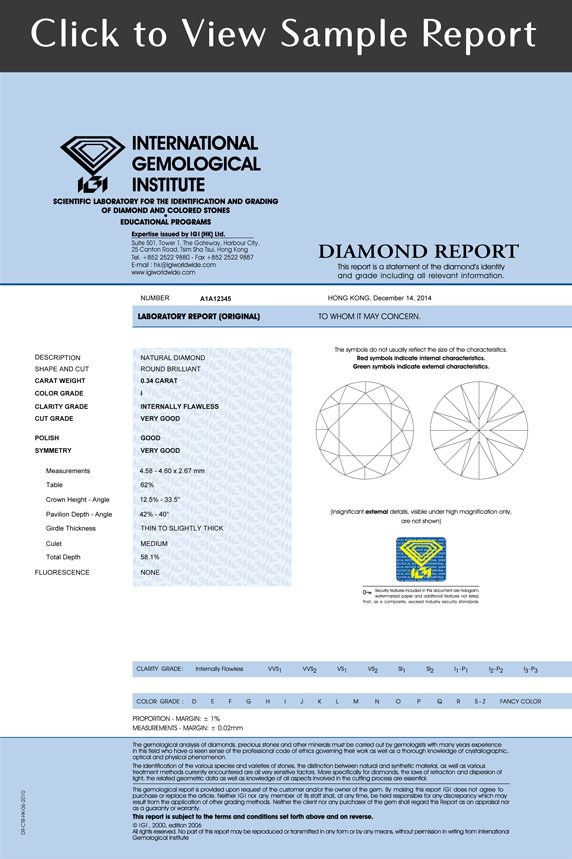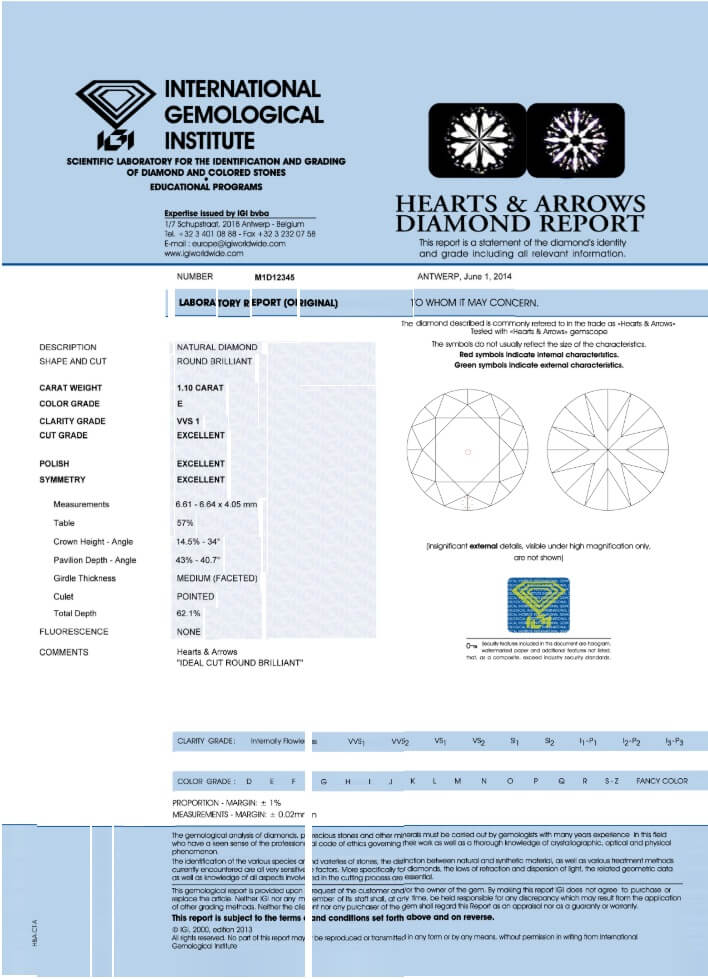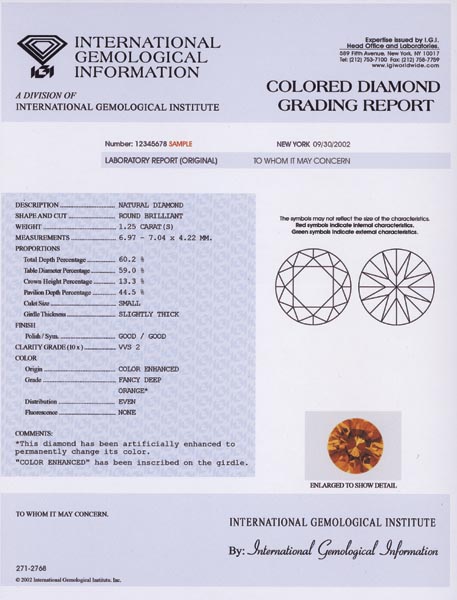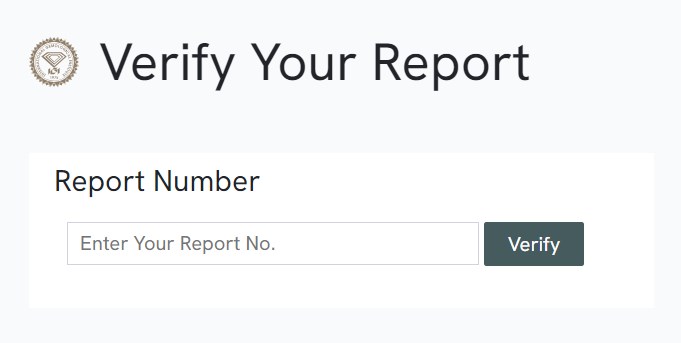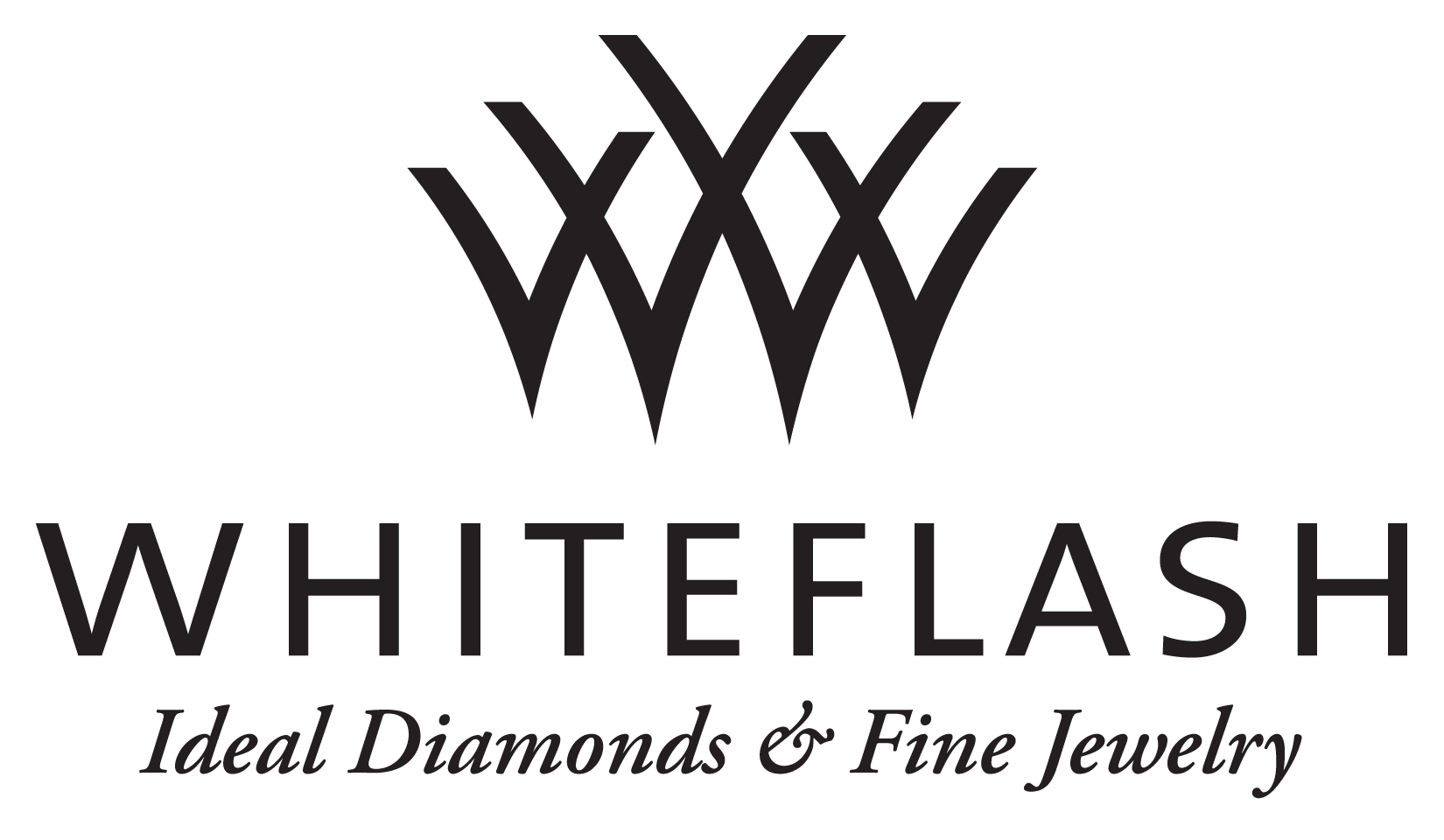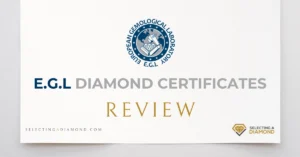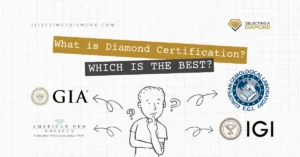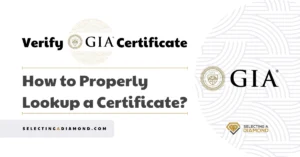Summary in a few lines:
In the world of diamond grading and certification, the Gemological Institute of America (GIA) and the American Gem Society (AGS) stand as the preeminent authorities. Their decades-long leadership in the field has established them as benchmarks of trust and quality, a reputation not easily matched.
However, it’s crucial to be wary of lower-tier labs like EGL and HDR, whose certifications may not be as reliable.
But amidst these, some labs have emerged as credible players in the industry. They may not reach the lofty standards of GIA and AGS, but they offer respectable alternatives.
Consider, for instance, two diamonds that are identical in cut, clarity, color, and carat weight.
The primary distinction lies in their grading labs: one is evaluated by IGI, and the other by GIA. This raises an interesting question: despite the identical specifications, do these diamonds share the same color grade?
There’s a room for skepticism.
When it comes to purchasing a diamond, the choice of a grading lab is pivotal, and if you’re opting for a natural diamond, why settle for an IGI certification when GIA or AGS options are available?
However, for lab-created diamonds, IGI has made significant strides. Retailers like James Allen offer a vast selection of lab-created diamonds graded by IGI, showcasing their competence in this domain.
Let’s get into details.
What are IGI Labs for Diamonds Certification?
The International Gemological Institute (IGI) is one of the prominent organizations in the world for the analysis and grading of diamonds, colored stones, and jewelry.
And by diamond grading, we refer to the process of evaluating and assigning a quality rating to a diamond based on key characteristics such as cut, color, clarity, and carat weight, very similar to the work done by GIA and AGS.
Established in 1975 in Antwerp, a city which is historically known as the “home of diamonds” and IGI is considered to be the oldest certification lab there.
Although it started as an institute for diamonds, colored gems, and jewelry certification, IGI expanded in offices, standards, and services, here are some key aspects of IGI and its labs:
- Diamond and Gemstone Certification: IGI provides expert analysis and detailed certification for diamonds and colored gemstones. These certifications typically include assessments of a stone’s 4Cs (Carat, Cut, Clarity, and Color), along with other characteristics like fluorescence, symmetry, and polish.
- Jewelry Certification: Beyond loose stones, IGI also certifies finished jewelry pieces, assessing the quality of the gems and metals used, as well as the craftsmanship.
- Education and Training: IGI offers educational programs for professionals and enthusiasts in the field of gemology. These courses cover various aspects of diamonds, colored stones, and jewelry design.
- Advanced Equipment and Techniques: The labs utilize advanced technology and equipment for gem testing and analysis. This includes the use of microscopes, spectrometers, and computerized tools to provide accurate grading and identification.
- Global Presence: IGI’s global network of labs ensures that their certifications are widely recognized and respected in the jewelry industry. This global footprint also facilitates easier access for international clients.
- Ethical Standards: IGI is committed to upholding high ethical standards in its operations, ensuring that the stones and jewelry they certify are sourced and processed responsibly.
 IGI Offices
IGI Offices
Since its foundation, IGI has expanded globally with numerous labs in key cities across the world.
The exponential growth in IGI presence is undeniable. Although they have started with one office in Antwerp, they now have +29 offices from LA to Hong Kong employing 1000+ gemologists in their offices.
IGI brands itself as the “largest international” labs, as they are located in many countries. However, this needs more explanation, since we saw in our GIA review that they have offices in 13 countries and almost 3,000 gemologists in their offices, so we’re not quite sure what they mean by the largest here.
Update: It looks like IGI has slightly changed their website headline from the “Largest organization of its kind” to the “World’s largest Independent Gemstone Grading Laboratory”, which kind of elaborates on their previous headline.
How IGI manages to standardize the grading process across all offices?
As for IGI reputation and if their certification process is reputable, it’s well-known that IGI operates on pre-set and documented standards and methodologies in the process of assessing and grading diamonds.
And just like any other franchise, these standards are applied across all their offices internationally, or maybe we should say “probably”?
Because it happened, and people on sites like Rapaport & RapNet communities have put this into test, they sent same diamonds to different IGI labs, and unfortunately results weren’t identical.
IGI Schools of Gemology
The interesting thing about IGI is that it has a School of Gemology, with 14 branches in Antwerp, Mumbai, Delhi, Hyderabad, Surat, Dubai, Shanghai, Ahmedabad, Chennai, Rome, Cavalese, Ascoli Piceno, Trecastagni, and Marcianise, where they offer diamond training and certification skills.
In addition, their website mentions that they graduate thousands of jewelry professionals every year.
How Popular is IGI in Diamond Grading & Certification?
GIA is probably connected to “diamond certification” in your head! Just like how Google is the only search engine we think is there (or we pretend to think so).
The same goes for the Diamond certification industry, it is not exclusive to GIA or AGS. Yes they are the most reputable & known labs, but there are tons of certification labs out there that are less popular.
IGI (International Gemological Institute) is quite popular in the diamond grading and certification realm, particularly for lab-grown diamonds.
While it doesn’t quite match the global recognition of the GIA (Gemological Institute of America) or the AGS (American Gem Society) in terms of natural diamonds, IGI has carved a significant niche for itself.
Is IGI a Good & Reputable Certification?
Over the past decade, the International Gemological Institute (IGI) has undergone significant evolution, markedly enhancing its reliability and standing in the diamond grading industry.
The IGI of ten years ago may not accurately reflect the institute’s current operations and capabilities. This transformation is evident in their improved grading practices for both natural and lab-grown diamonds.
Notably, IGI has made substantial strides in the realm of lab-grown diamonds, capitalizing on an opportunity presented by the Gemological Institute of America’s (GIA) slower engagement in this rapidly growing sector.
As GIA focused more traditionally on natural diamonds, IGI astutely filled the gap, emerging as a key player in certifying lab-grown diamonds.
This strategic move allowed IGI to capture a significant market share in this area, bolstering their reputation and demonstrating their adaptability and foresight in an evolving gemstone market.
To clarify, IGI’s expertise isn’t limited to lab-grown diamonds; they also possess extensive experience in grading natural diamonds, which we will delve into in more detail shortly.
Major Stores Selling IGI-Certified Diamonds
When exploring diamond options at Blue Nile, you might notice a lack of IGI-certified diamonds. However, James Allen, a leading online diamond retailer, is increasingly incorporating IGI-certified collections into their offerings. In fact, James Allen currently boasts over 20,000 IGI-certified natural & lab diamonds in their inventory.
As the largest online diamond retailer with a selection exceeding 300,000 diamonds, James Allen’s decision to feature IGI-graded diamonds is noteworthy. This endorsement merits serious consideration and invites a thoughtful, comprehensive comparison with diamonds certified by the renowned GIA.
Brilliant Earth is a major seller of IGI lab created diamonds, they currently have 29000+ (yes, 290k) lab-grown diamonds that are graded by IGI.
One critical aspect to ponder when purchasing a diamond is the type of certification it carries. The choice of the certifying lab, which assesses and grades the diamond, is a pivotal factor in determining the gem’s credibility and value.
GIA vs IGI Comparison in Diamonds Grading & Certification
Addressing the Ultimate Question: Is IGI Comparable to GIA or AGS?
When considering whether the International Gemological Institute (IGI) matches the standards of the Gemological Institute of America (GIA) or the American Gem Society (AGS), the answer isn’t straightforward.
IGI’s quality and reliability sit between these industry leaders (GIA & AGS) and lower-tier labs (like EGL).
IGI follows clear guidelines for grading and assessing diamonds, but their criteria may not be as rigorous as those of GIA and AGS.
This difference in stringency can be attributed to various factors, including the types of inspection tools used and the expertise of the gemologists employed at their local offices. While IGI is respected and credible, its place in the hierarchy of diamond grading is distinct, offering a middle ground in terms of rigor and precision.
But that’s not the whole story, as this doesn’t necessarily mean their grading is bad, let’s see an example and then how you should approach this.
Consistency in Diamond Grading: GIA vs IGI Comparison
In our comprehensive analysis and comparison of diamonds graded by the Gemological Institute of America (GIA) and the International Gemological Institute (IGI), we observed a tendency for slightly higher grading by IGI, particularly in terms of clarity and color.
For instance, a diamond graded VVS2 by GIA might receive a VVS1 rating from IGI. Similarly, a diamond classified as F color by GIA could be assessed as E grade by IGI.
In some cases, the discrepancy can extend to two grades, such as a diamond rated I1 by GIA being graded as SI2 by IGI.
It’s important to note that while this pattern of grade inflation by IGI is notable, it’s not universal.
In comparison, our review of EGL Labs revealed a more pronounced tendency to inflate grades, sometimes by two or even three grades.
Some would say: Okay, IGI doesn’t have that issue though, its inflation is by one grade at most, and probably will be reflected in price, so this doesn’t sound “a big deal”!
Well, we wouldn’t say that it’s “not” a big deal, nor it is! It all comes down to the specific diamond itself and your intention behind getting it (are you willing to resell anytime for example?) Will you be insuring it for instance?
Why Choosing Reliable Certification is Critical?
You’ll notice that we are focusing a bit too much on the “diamond certificate” and advising that you do too; even more than ANY other factor.
Even more than the cut (although it stands on top of 4Cs order of importance).
Why is that?
Generally speaking, getting a diamond with grades that are higher than its actual grades (even as little as one grade difference) is not recommended, for several reasons:
- You are paying an extra amount of money for a higher grade that doesn’t actually exist. However, this is not the case all the time, IGI diamonds are cheaper than GIA, because “they know” that they are not as reliable as GIA, so you won’t be paying more money at all times.
- Reputation matters: When you want to sell the diamond, it won’t be easy to convince a seller with a diamond certified by any lab other than GIA or AGS!
- Even if you were able to sell it, you will also lose more money.
- In general, most diamond insurance companies cover diamonds that are certified by either GIA or AGS.
- Some grades are sensitive, like H color, as it’s the recommended grade to get in order to have a colorless diamond to the naked eye, a diamond graded as H by IGI might be graded I by GIA, and that’s a big difference.
If you found two diamonds graded the same color & clarity (one by GIA & another by IGI) for the same price or even close, it would be wise to pick the GIA diamond as the IGI in this case might be a bit overpriced in this case.
Also Read: Diamond Certification: How to Read a Diamond Grading Report?
Labs Business Models: IGI (Profit-Driven) vs. GIA (Non-Profit)
IGI operates as a for-profit entity.
For much of its history, it was essentially a family business, this changed in late 2018 when Fosun, a major Chinese conglomerate based in Shanghai, acquired a significant 80% stake in IGI.
The transaction, rumored to be around €100 million, underscores the substantial scale of IGI’s operations in the gemological industry.
In contrast, GIA works as a non-profit organization.
This means that its operations are not driven by profit motives; rather, its primary focus is on the quality and integrity of its diamond grading services.
In this non-profit model, there are no individual getting rich by grading more diamonds (or making it faster, easier, cheaper), this fundamental difference in business structure between IGI and GIA can have implications for their respective approaches to diamond grading and certification.
IGI Grading & Reporting Services Review
IGI, known for its expertise in diamond and gemstone grading, provides a variety of reports detailing the characteristics of diamonds and other jewelry pieces. We will highlight some of their key reports:
1- Loose Diamonds Report
This report, comparable to those from other industry players like GIA and AGS, evaluates a diamond’s features.
It includes the standard 4Cs grading, the diamond’s shape, polish, and symmetry details (including measurements, table, and depth), as well as fluorescence characteristics.
Additionally, the report features a visual representation highlighting any inclusions in different parts of the diamond. Here’s an example of a typical IGI diamond report:
2- Hearts & Arrows Diamonds Report
The increasing popularity of Hearts & Arrows diamonds, featured in collections like James Allen’s True Hearts™ and Blue Nile’s Astor™, has opened a niche for IGI’s specialized grading services.
With GIA not focusing on these premium cuts, IGI provides detailed reports for these precisely cut diamonds and mentions specifically if a diamond has Hearts & Arrows.
IGI employs a specific Hearts & Arrows gem scope to verify the perfect alignment and symmetry of each diamond. Their report mirrors the standard format but includes an additional comments section to affirm the diamond’s Hearts & Arrows status, as shown in the example report below:
3- Colored Diamonds Report
IGI’s Colored Diamonds Report caters to the distinct assessment needs of colored diamonds, which are evaluated differently from the traditional D-M color range of ‘colorless’ diamonds. This specialized report is crucial due to the fact that many treated diamonds are being sold in the market as natural colored diamonds.
The report provides in-depth analysis of a colored diamond’s features, including the color’s origin (whether natural or treated), the color grade, its distribution, and additional comments.
4- Synthetic / Lab-Created Diamonds Report
And here, IGI shines and dominates the grading industry.
IGI excels in grading synthetic or lab-created diamonds, a segment where they have established dominance.
A vast majority of lab-grown diamonds from major retailers like James Allen, Clean Origin, and Brilliant Earth are graded by IGI.
The appeal of lab-created diamonds has grown due to their cost-effectiveness and ethical advantages over conflict diamonds. Despite common misconceptions, it’s virtually impossible to distinguish a lab-created diamond from a natural one with the naked eye.
IGI’s report for lab-grown diamonds mirrors that of natural diamonds, with a clear designation that the diamond is “Laboratory Grown”. This transparency is crucial for informed purchasing decisions.
For those considering a lab-grown diamond, we recommend exploring our comprehensive guide on what to know about these lab-created diamonds before making a purchase.
Verify IGI Grading Reports
When it comes to confirming the authenticity of a diamond certified by the International Gemological Institute (IGI), the process is similar yet distinct from that of GIA.
1. Report Number Verification
Each IGI certificate has a unique report number. Verify this number on the IGI website’s verification tool to ensure the report’s legitimacy.
2. Match Diamond Characteristics
Review the diamond’s 4Cs (Cut, Clarity, Color, and Carat Weight) as stated on the certificate.
When shopping for diamonds online, leverage the zoom feature and HD imagery to closely examine the stone. This allows for a thorough inspection of the diamond’s clarity and inclusions, ensuring they match the report.
In a physical store, get a detailed view by using a jeweler’s loupe or magnifier.
3. Security Features Check
For newer IGI certificates, look for security enhancements like holograms or micro-inscriptions on the diamond. These features provide additional assurance that the certificate corresponds to the diamond in question.
By following these steps, you can confidently determine the authenticity of an IGI-certified diamond, safeguarding your investment and ensuring peace of mind.
Summary: GIA vs IGI Grading Standards, Should You Get an IGI Diamond?
After all that has been discussed above, and although James Allen does sell IGI-certified diamonds, we wouldn’t always suggest to go with an IGI-certified diamond. For example, after it has been inspected and matched with similar diamonds from GIA or AGS, are they the same price? Or will you be getting a better deal on it?
Another important point to keep in mind is to check if the diamonds are high grade on color and clarity. In many cases, we’ve seen the inflation of grades in IGI happen on lower clarity (SI2 & SI1) & color (I & J) grades.
Our top recommendation on diamonds is to always get a GIA or AGS diamond (with GIA being the first go to option because it’s simply the best certification lab out there).
Still not sure where to buy your diamond?
We always recommend shopping diamonds online and created a Full guide to shop diamonds like a Pro.
Among online retailers, here are our favorite stores click their logo to visit store
-
James Allen:
Our favorite online store, best diamond imaging technology available today, comes with the largest collection with more than half a million loose diamonds.
-
Blue Nile:
Widest collection of loose diamonds of all sizes, great imaging technology for most of their inventory (hundreds of thousands of diamonds), great customer support.
-
Whiteflash:
Home Of A CUT ABOVE® Super Ideal Diamonds, they stand out from the crowd by offering premium diamonds cuts, tailored to those who love the details, at great prices too.

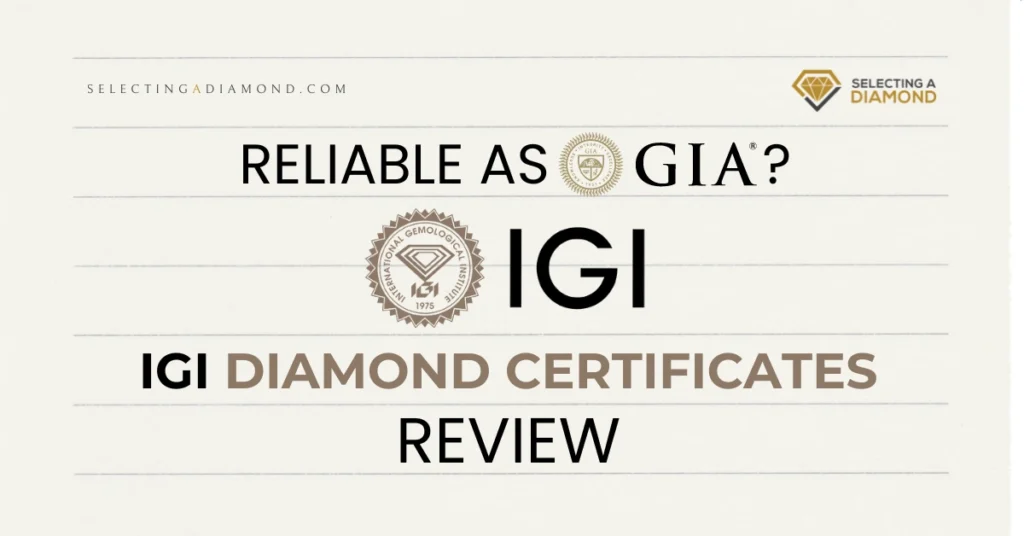
 IGI Offices
IGI Offices



